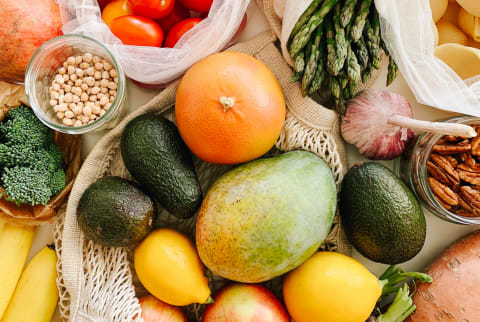Advertisement
Eating This Many Fruits & Veggies A Day May Lower Stress Levels, Study Suggests


There are plenty of tools we can turn to for help managing stress: meditation, journaling, talking to a therapist, etc. Now, according to new research, you can add digging into a bowl of fresh fruit to that list.
A study published in the journal Clinical Nutrition earlier this spring found that eating a diet rich in fruits and vegetables is associated with lower stress levels. Not only that, but researchers also found the ideal serving size that may make a difference.
The ideal serving of fruits and veggies for stress.
According to the researchers from Edith Cowan University in Australia, eating 470 grams (~ 2 cups) of fruits and veggies per day may be optimal for stress management. In the study of more than 8,600 people, those who ate around 2 cups of produce per day had 10% lower stress levels than those who consumed less than 230 grams (~1 cup).
"We found that people who have higher fruit and veggie intakes are less stressed than those with lower intakes, which suggests diet plays a key role in mental wellbeing," lead researcher and Ph.D. candidate Simone Radavelli-Bagatini said in a news release.
How fruits and veggies help with stress.
The researchers were not able to determine why eating more fruits and veggies enhances mood, but Radavelli-Bagatini suggests their high nutrient count likely plays a role. "Vegetables and fruits contain important nutrients such as vitamins, minerals, flavonoids, and carotenoids that can reduce inflammation and oxidative stress, and therefore improve mental wellbeing," she said.
And she's not alone in that thinking: There's an entire field of medicine (called nutritional psychiatry) dedicated to studying the effects food has on the mind.
While eating 2 cups of produce per day may be enough to help lower stress levels, don't just call it quits there. To meet daily nutritional needs (i.e., proper intake of vitamins, minerals, fiber, etc.), the U.S. Department of Agriculture recommends healthy adults eat at least 1.5 to 2 cups of fruit per day and 2 to 3 cups of vegetables per day.
Watch Next
Enjoy some of our favorite clips from classes
Enjoy some of our favorite clips from classes
What Is Meditation?
Mindfulness/Spirituality | Light Watkins
Box Breathing
Mindfulness/Spirituality | Gwen Dittmar
What Breathwork Can Address
Mindfulness/Spirituality | Gwen Dittmar
The 8 Limbs of Yoga - What is Asana?
Yoga | Caley Alyssa
Two Standing Postures to Open Up Tight Hips
Yoga | Caley Alyssa
How Plants Can Optimize Athletic Performance
Nutrition | Rich Roll
What to Eat Before a Workout
Nutrition | Rich Roll
How Ayurveda Helps Us Navigate Modern Life
Nutrition | Sahara Rose
Messages About Love & Relationships
Love & Relationships | Esther Perel
Love Languages
Love & Relationships | Esther Perel
What Is Meditation?
Box Breathing
What Breathwork Can Address
The 8 Limbs of Yoga - What is Asana?
Two Standing Postures to Open Up Tight Hips
How Plants Can Optimize Athletic Performance
What to Eat Before a Workout
How Ayurveda Helps Us Navigate Modern Life
Messages About Love & Relationships
Love Languages
Advertisement

What Men Are Getting Wrong About Mental Health, From A Psychologist
Stephen B. Poulter, PhD

Your Grandma's Go-To Supplement Is Once Again Popular (For A Good Reason)
Molly Knudsen, M.S., RDN

What Men Are Getting Wrong About Mental Health, From A Psychologist
Stephen B. Poulter, PhD

Your Grandma's Go-To Supplement Is Once Again Popular (For A Good Reason)
Molly Knudsen, M.S., RDN













